Are solar panels worth it?
Index
- What Is the cost of solar PV panels?
- What are the labour costs of installing Solar PV Panels?
- What factors affect the initial outlay of solar PV panels?
- How much can you save with solar PV panels?
- How much do solar PV panels save on electricity?
- Will I break even with solar PV panels?
- The factors that affect the break-even point of a solar PV panel?
- Does location affect when you break even with Solar PV Panels?
- Does using solar battery storage make solar PV panels more worthwhile?
- What is solar PV panel battery storage?
- How does a solar battery work?
- Are solar PV panels a good investment in 2023?
- Can solar PV panels increase the value of your home?
- Can you make money from unused electricity?
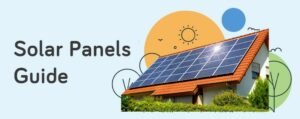
Solar PV Panels usually break even on Solar PV Panels in 13+ years, on average.
Solar PV Panels will typically cut your electricity bills by 67%
House prices increase by 1% to 2% with Solar PV Panels.
The most commonly asked question asked around renewable energies is “Are solar panels worth it?”
The simple answer is Yes! Solar photovoltaic panels are absolutely worth it!
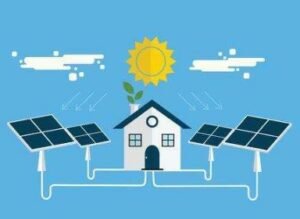
It typically takes over 13 years for the average household to recover their investment in domestic Solar Photovoltaics Panels. This is possible because, even with the UK’s frequently overcast weather, Solar PV can still accumulate enough sunlight to reduce your electricity costs by more than half, even in the most northerly regions of Scotland.
Furthermore, if you decide to sell your property before the break-even point, you can expect to earn an average of 1% to 2% more than what you would have received without Solar PV Panels. Our service also offers the opportunity to evaluate different PV panel installation costs. Just provide a few brief details and our skilled installers will provide you with complimentary quotations for you to consider.
What is the cost of solar PV panels?
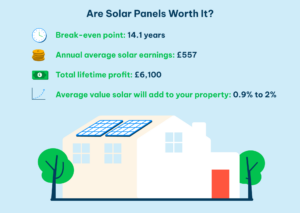
In 2023, you can expect to pay between €400.00 and £500.00 for a standard 250W solar panel. However, the price to install solar panels can vary, considering how much solar energy, the type install solar panels, and the overall size of the Solar PV Panels. For instance, a frequently chosen 4kW Solar PV panel could cost you approximately €6,900 and it will take up roughly 30 sqm of your roof area.
Thanks to advancements in solar technology, there has been a considerable decrease in PV panel costs over the previous 3 to 5 years. As a general principle, the larger the electricity production capacity of your Solar PV Panels, the higher the upfront, initial outlay solar panels will be. But, in the longer term, bigger systems also yield greater savings. For example, a 3kW system might be less costly to set up, but over a period of 15 years, it won’t provide as much how much energy, power or financial savings as a 6kW system. Additionally, since the UK Government abolished the VAT on energy-saving measures in April 2022, there’s an opportunity for further savings.
What are the labour costs of installing Solar PV Panels?

When you receive a quote for your Solar PV Panels, it generally includes the cost of labour. There are two common methodologies to calculate these labour costs for PV panel installations in the UK.
One method is to estimate a daily rate per person, typically between €300 and 500. Given that the installation process usually involves two people, the final installation fee tends to be in the range of €600 to €1,000. However, if you’re installing a larger system that requires more than a single day to install, the costs would naturally increase.
Another method to determine the installation fee is by charging 20 pence per watt. Therefore, for a system of 4kW, you’d multiply 20 pence by 4000 watts, leading to a total cost of €800.
What factors affect the initial outlay of Solar PV Panels?
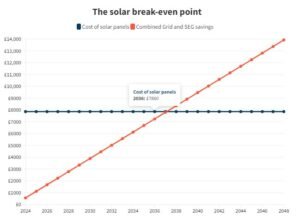
The estimated prices for Solar PV Panels given in the table are a general guide based on the type of system you opt for. The actual cost of installing Solar PV Panelsat your home, however, will be influenced by the following considerations:
Size of the System: Solar PV Panels are available in various sizes, and the best fit depends on how many solar panels, the size of your home and your specific electricity usage needs. In essence, larger Solar PV Panels will carry a higher installation cost. An average 4kW system, for instance, will cost approximately €6,000 to install. It’s also worth mentioning that the cost of solar panels per kW tends to decrease as your system size increases.
Panel Types: The three most frequently used types of Solar PV Panels for residential use are monocrystalline, polycrystalline, and thin-film Solar PV Panels. Monocrystalline solar panels cost and are the most efficient but also come with a higher price tag. If you’re leaning towards a budget-friendly option, then polycrystalline may be the right choice. High-efficiency monocrystalline Solar PV Panels cost between €1 to €1.50 per watt, while polycrystalline solar panels cost anywhere between €0.90 to €1 per watt.
Installation Procedure: The complexity of the installation process also impacts the initial outlay of Solar PV Panels. You can choose to install the Solar PV Panels yourself or engage a professional. Self-installation requires considering factors such as the number of panels, the panel orientation, and the strength of your roof. Although it is feasible to carry out the installation yourself, to qualify for the Smart Export Guarantee and earn money for returning energy to the grid, your Solar PV Panels would still need certification from a professional.
Additional System Components: If you plan to install other components in tandem with your Solar PV Panels, this will increase your equipment cost but may lower the overall installation charges. If you intend to install solar batteries storage system or additional features such as bird-proofing for your panels, it’s best to combine these with the panel installation to minimize the installation cost.
Geographic Location and Labour Expenses: Labour costs are generally included in the installation price, but these can fluctuate based on the location and the local labour rates. Typically, it costs between €300-€500 per person per day, but this can vary depending on your specific location within the UK.
How much can you save with solar PV panels?
Solar PV Panels allow you to reduce your electricity bills significantly. The power you utilise when your solar panels save and are operational comes at no cost, leading to potential annual savings between €850 and €1,460+. However, accurate estimates require a comprehensive understanding of each household’s specific details.
The real economic benefit of Solar PV Panels is realized over the long term, particularly through the Smart Export Guarantee (SEG). Depending on your system and tariff, your savings over a 15-year span, including SEG, could range from €21,250 to €40,325+.
In essence, the amount you can save with Solar PV Panels hinges on several factors:
- Your home’s electricity usage
- Your tendency to use appliances when your panels are in operation during the day
- The efficiency of your chosen panel type
- The potential income from pv panel subsidy schemes

By using your appliances, such as washing machines and dishwashers, during the day when the sun is shining and your Solar PV Panels are active, you can amplify the savings on your bills. Small behavioural changes can result in significant energy bill reductions.
Furthermore, the efficiency of your Solar PV Panels also influences your potential savings. Monocrystalline panels, while more expensive, offer superior efficiency, whereas polycrystalline panels, although cheaper, are less efficient. The higher your system’s efficiency, the more electricity it can produce in each timeframe.
Don’t let another month of high energy bills slip away. It’s the perfect time to embrace solar! A solar photovoltaic (PV) system is an excellent choice for your home, promising thousands of pounds in savings over its lifespan
Today, get the best-priced quotes from up to three reputable panel installers and start reaping the benefits of the long-term savings associated with renewable energy solutions and products. Avoid the hassle of spending hours researching and vetting local installers. By completing our 30-second form, you can bypass all that effort. Plus, the best part is that all the quotes you receive are free and come with no obligation to accept.
How much do solar PV panels save on electricity?
As of 1 October 2022, the electricity price cap in the UK has surged to 34p per kWh, along with a daily standing charge of 45p, marking its highest level since the 1950s. It’s forecasted that the cap will increase further in April 2023, pushing the average household energy bill to €3,000 per year.
With electricity costs spiralling upward, every kilowatt of power produced by your Solar PV Panels equates to a unit of energy that you won’t need to purchase from your energy supplier again.
To accurately determine the savings Solar PV Panels, offer on electricity bills, a comparison of expenditures without Solar PV Panels versus those with an installed system can be instructive.
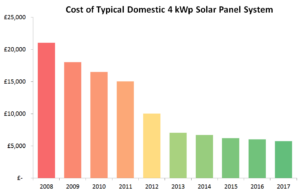
Each home has unique consumption levels and sunlight exposure, hence for this comparison, we’ll use the author’s Bristol-based home as an example. The panel system initially cost €5,524.00.
According to the Microgeneration Certification Scheme’s (MCS) report on UK sunlight data, Bristol (Zone 5E) boasts an irradiance factor of 928. Multiplying this irradiance factor with the PV panel system size and making shade adjustments offers a reasonably accurate estimate of a home’s panel output. The formula is system size x irradiance factor x percentage shade factor = estimated annual output (in kWh).
Thus, with a 5.5kWp system and zero shade factor, the formula is 5.5 x 928 x 100% = 5,064kWh in the first year.
The author’s home is projected to consume a total of 10,276kWh of grid electricity over the next year. At 34p per kilowatt, this sums up to €3,493.84 for the year. Adding the standing charge of 45p per day equates to an additional €164.25. Therefore, without Solar PV Panels, the author’s home would expend €3,658.09 on electricity in a year.
Will I break even with solar PV panels?
The average payback period for a PV panel system is approximately 13 years or more.
A standard 3.5 kilowatt-peak PV panel system generally costs around €5,500. According to data from the Energy Saving Trust, for an average home in a central location, it can take between 10 and 17 years to recover the investment costs of installing Solar PV Panels, based on current Energy Price Guarantee rates. This depends on your electricity consumption, usage timings, and the remuneration under the Smart Export Guarantee.
With the soaring price of energy and decreasing costs of Solar PV Panels, the savings generated by using self-produced solar power have become much more significant than before.

Under the Smart Export Guarantee (SEG) scheme launched in January 2020, British households are compensated for the solar energy they ‘export’, or the electricity generated and not consumed, which is then fed back into the national grid. The earlier Feed-In Tariff scheme (which closed to new applicants in March 2019) was considerably more generous, offering higher rates and compensation for energy generation, even if it was used domestically.
The exact break-even point can vary greatly depending on several factors such as:
- The initial cost of the solar PV panel system.
- Quality of the system (for instance, a system optimized for low-light conditions using microinverters and bifacial panels is likely to perform significantly better than a standard setup).
- Your annual electricity consumption.
- Current electricity rates.
- Self-consumption prioritization, meaning minimizing grid energy usage as much as possible.
- Use of solar battery storage.
- Savings and/or earnings from the Smart Export Guarantee (SEG).
To compute the payback period of your solar investment, you should understand these variables and their impact on the break-even calculation.
However, if you can afford the initial investment for the panels using savings, it may be worth exploring the numbers yourself as the SEG scheme can be beneficial for some (we provide a detailed analysis of likely savings and earnings below).
The primary advantage of solar power is using the energy generated by your panels, potentially saving you up to €480/year on your electricity bills. How much on energy bills you save depends on the size of your system, electricity usage, and whether you’re at home during the day to use the energy you’re generating, among other factors.
However, based on estimates from the Energy Saving Trust, a typical household with a 3.5 kilowatt-peak system can reduce its bills by €195 to €480 annually, given the current Energy Price Guarantee rates.
The factors that affect the break-even point of a solar PV panel system
Factors influencing your payback time – Both the combined expenses and annual benefits of adopting solar energy affect your solar payback period. These consist of:
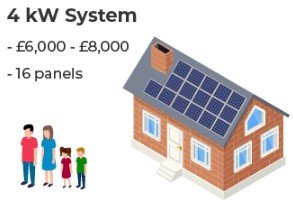
Cost of solar panel system – The total cost of installing a solar system in your home depends on the size of the solar panel system that you choose and the components that comprise that system.
Significance of upfront financial incentives – Tax benefits and refunds can significantly decrease the total cost of transitioning to solar. The federal investment tax credit (ITC) permits you to deduct 30 per cent of your system’s cost from your taxes, and additional state and local solar incentives may be accessible in your region.
Average electricity consumption and cost per month – Your monthly energy usage signifies both the size of the system you require and the amount of electricity you can counterbalance each month with free solar power alone. Similarly, the energy costs in your region directly affect your return on investment (ROI) from your solar power system. – The higher your electricity bills, the shorter your projected payback period will be, as you can reduce or eradicate your utility bill as soon as your solar panels save and are operational.
Estimated electricity generation – While solar installers will attempt to provide you with a system that aligns with your electricity usage, practical constraints like the size of your roof and seasonal weather variation may affect the amount of electricity that you can produce on-site.

Does location affect when you break even with solar PV panels?
While solar arrays can potentially benefit anyone in the UK, it’s important to note that the location of your property can impact the amount of sunlight your solar panels are worth receiving annually and, consequently, the energy they generate.
Furthermore, the angle, pitch, and shading of your roof can also influence potential energy generation. If your roof is indoors, we advise against installing Solar PV Panels. However, this issue can be addressed by opting for a solar system designed for low-light conditions, which can enhance the sun’s energy generation potential.
Considerations for solar panel installation:
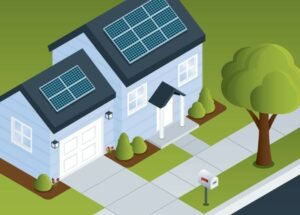
Loft Space: Ensure you have a small area in your attic to accommodate the inverter, which is approximately the size of a microwave.
Structural Integrity: It is advisable, particularly for older houses, to assess the structural soundness of your roof before installing Solar PV Panels weighing around 500 kilograms. Most installers have access to structural engineers who can calculate the wind load if any signs of roof distress are detected.
Aspect: Ideally, your roof should face true south to maximize electricity generation. However, installing Solar PV Panels on east or west-facing roofs is still viable, with only a minor loss in power output (around 15%). Solar PV Panels may not be suitable for properties with a north-facing roof or if the house is predominantly shaded.
Pitch: The optimal roof angle ranges between 35° and 40°, although angles between 10° and 60° are also acceptable. For flat roofs, Solar PV Panels can be mounted on angled supports to improve efficiency.
For optimal power generation, Solar PV Panels should ideally face true south. Roofs facing southwest and southeast are also highly efficient. East or west-facing roofs experience a slight decrease in efficiency (approximately 15%) compared to south-facing roofs. Generally, north-facing roofs are not ideal. Although most properties with a north-facing roof may have an opposite roof face, the building’s layout may not allow for this scenario.
However, it is still possible to harness more solar power even in properties with a north-facing roof. Panels can be angled against the roof’s slope, although this may affect the aesthetic appearance of the roofline. Alternatively, ground-level placement is an option, provided there is minimal shade. Even a slight deviation from true north can ensure efficient Solar PV Panels.
Does using solar battery storage make Solar PV Panels more worthwhile?

Yes. Given the soaring energy costs and increasing global efforts to address climate change and reduce carbon emissions, it’s no surprise that numerous homeowners are embracing domestic solar photovoltaic (PV) systems.
Opting for Solar PV Panels to generate renewable energy offers several advantages for homeowners, including cost savings, enhanced control and reliability of energy supply, and greater sustainability. The choice of panels, whether monocrystalline or polycrystalline and the selected inverter are crucial factors affecting the energy efficiency and lifespan of a solar PV system.
A common concern among homeowners considering residential Solar PV Panels is whether the excess energy generated during daylight hours will go to waste. There are two potential options: the surplus energy can either be fed back into the UK National Grid in exchange for small payments or stored for later use if you have a battery storage system. One of the benefits of solar storage is the functionality of charging an EV vehicle through the evening time. If you would like more information about Home EV Car Chargers, please contact the team and we’ll be more than happy to talk you through your options.
What is solar panel battery storage?
Solar batteries enable you to store any excess electricity produced by your solar photovoltaics system during daylight hours and utilize it when your home requires more energy than your Solar PV Panels can generate. This becomes especially beneficial during nighttime when sunlight is unavailable.
In the absence of a solar battery integrated with your solar PV system, any surplus energy would be fed back into the National Grid. By incorporating solar batteries into your setup, you can effectively store and utilize renewable green energy, maximizing the self-consumption benefits of solar panels and the energy you generate for your home.
How does a solar battery work?

Solar PV battery systems operate by storing direct current (DC) electricity. When your solar Photovoltaics system generates more energy than you currently consume, the excess energy is directed towards charging the battery. Later, when your energy demand surpasses the output of your Solar PV Panels, you can tap into the stored energy in the battery.
Most solar batteries include built-in inverters that convert DC into alternating current (AC), which is then utilized to power various aspects of your home, such as heating, lighting, appliances, and devices. Some solar batteries are specifically designed to integrate with your solar PV system, sharing the same inverter that converts the DC generated by your Solar PV Panels into AC for your household appliances to use.
Once solar batteries reach full capacity, any surplus energy generated by the solar PV system is redirected to the National Grid. With the combination of solar PV and battery storage, you will only draw electricity from the grid when your system is not generating excess power again, and the energy stored in the battery has been depleted.
Are solar PV panels a good investment in 2023?
The decision to invest in Solar PV Panels is not universal and depends on individual circumstances. It can be a favourable investment for some homeowners while not as beneficial for others. As a general rule, Solar PV Panels tend to be a worthwhile investment if you have high electricity costs, ample roof space that receives abundant sunlight and intends to remain in your home for an extended period.
Can solar PV panels increase the value of your home?
 To begin with, just like adding an extension or upgrading your kitchen can increase the value of your house, installing solar PV panels immediately boosts its worth. Research conducted by Solar Energy UK indicates that installing photovoltaic (PV) panels on a typical home could raise its value by €1,891-€2,722. Solar-equipped properties tend to command a price premium of approximately 0.9% to 2%. Essentially, this means that the sale price of a home can increase by how much power for half the cost of installing a PV system.
To begin with, just like adding an extension or upgrading your kitchen can increase the value of your house, installing solar PV panels immediately boosts its worth. Research conducted by Solar Energy UK indicates that installing photovoltaic (PV) panels on a typical home could raise its value by €1,891-€2,722. Solar-equipped properties tend to command a price premium of approximately 0.9% to 2%. Essentially, this means that the sale price of a home can increase by how much power for half the cost of installing a PV system.
Naturally, the value of your house is influenced by various factors. However, if you have plans to sell soon, installing solar PV panels could be a smart strategy to secure a higher selling price. – Also see out Solar Carports, they can also add value to the property!
Solar PV panels also offer significant savings on your energy bills and low-carbon electricity too. With energy costs reaching record highs and the price cap rising by €3,000 per year since the winter of 2021/2022, reducing your electricity expenses has become increasingly crucial. While solar PV may not lead to drastic bill reductions, the savings can certainly make a difference in how much energy is used.
By utilizing solar energy, you avoid drawing energy from the grid, which would otherwise incur charges. Although the savings may appear modest in the short term, they accumulate over time. In areas with high electricity prices, the savings can be even more substantial.
Furthermore, there are additional ways to maximize your solar savings. For instance, installing a battery allows you to store excess energy generated by your solar PV panels during the day and utilize it at night, further optimizing your energy usage and savings.
Can you make money from unused electricity?

When your solar PV panels generate more energy than you require, you can sell the excess electricity back to the grid. Previously, this was facilitated through the Feed-in-Tariff program, but now it is accomplished through the Smart Export Guarantee (SEG). Under the SEG, you receive payment for each unit of electricity you export back to the grid, and this is measured by a smart meter.
While energy prices may fluctuate, it is common to see rates of around 5 or 6p per kilowatt-hour (kWh). At these rates, homeowners typically report earning approximately €150-200 per year with no additional effort. If you view your own solar array and PV panels as a long-term investment, this translates to average annual savings of a few hundred pounds annually, accumulating to thousands of pounds over the typical lifespan of a Solar PV Panel system.
Get a Free Quote for your New Solar System
If you are contemplating the installation of solar PV panels, we strongly recommend obtaining quotes from a minimum of three installation companies. To simplify the process, we have created a free solar energy quote tool that can provide you with an estimate. Simply answer a few questions about your property, and the tool will generate a new solar quote presenting a range of options. This ensures convenience and helps you explore different possibilities for your installation. – If you would like any further information, please contact the team at Solares Energies.
Common Questions Asked about Solar Panes
- How do solar PV panels work?
- What is the average lifespan of solar PV panels?
- How much does a solar PV panels system cost?
- What are the benefits of solar PV panels?
- What are the maintenance requirements for solar PV panels?
- Are solar PV panels effective in all climates and weather conditions?
- What government incentives are available for installing solar PV panels?
- How much can I expect to save on my electricity bill with solar PV panels?
- What happens if I generate more electricity than I use?
- Can I completely go off the grid with solar PV panels?
- Can my roof support the weight of solar PV panels?
- Do solar PV panels work during power outages?
- How long does it take to install a solar panel system?
- What are the environmental benefits of solar energy?
- Will solar PV panels increase the value of my property?
- How do I choose the best solar panel provider?
- What are the differences between monocrystalline, polycrystalline, and thin-film solar PV panels?
- Are there any hidden costs associated with solar panel installation?
- Do I need any special insurance for solar PV panels?
- Can I install solar PV panels myself?
- What happens to solar PV panels at the end of their life?
- Can solar PV panels be recycled?
How do solar PV panels work?
Solar panels work by harnessing the energy from sunlight and converting it into usable electricity. They are made up of photovoltaic (PV) cells, typically composed of silicon, that generate an electric current when exposed to sunlight. The photons in sunlight excite the electrons in the PV cells, creating a flow of electrons that can be captured as direct current (DC) electricity. An inverter then converts the DC electricity into alternating current (AC) electricity, which is compatible with the electrical systems of homes and businesses.
What is the average lifespan of solar PV panels?
The average lifespan of solar panels is typically around 25 to 30 years. Most reputable manufacturers provide warranties guaranteeing that the panels will still operate at a certain capacity (usually 80% or higher) after 25 years. With proper solar panel maintenance and care, solar panels can continue to generate electricity beyond their expected lifespan.
How much does a Solar PV panel cost?
The cost of Solar PV Panels varies depending on several factors, including the size of the system, using how many solar panels how much do solar panels, how many solar panels are used, the type of panels used, the installation complexity, and regional factors. On average, residential solar panel systems can range from £4,000 to £15,000 or more. It is recommended to obtain quotes from multiple installation companies to get an accurate cost estimate tailored to your specific needs.
What are the benefits of solar PV panels?
Solar panels offer numerous benefits, including:
Reduced electricity bills: By generating your own electricity, you can offset or even eliminate your reliance on the grid, resulting in significant savings over time.
Renewable and clean energy: Solar pv energy is a clean and renewable green energy source that helps reduce greenhouse gas emissions and dependence on fossil fuels.
Increased property value: Homes equipped with solar panels often have higher resale values and can attract environmentally conscious buyers.
Energy independence: Solar panels provide a degree of energy self-sufficiency and reduce vulnerability to rising energy costs.
Government incentives: Many regions offer financial incentives, such as tax credits or feed-in tariffs, to encourage solar panel installations.
What are the maintenance requirements for solar PV panels?
Solar panels are generally low-maintenance. Regular cleaning to remove dust, debris, or any shading is recommended to maximize their efficiency. This can typically be done with water and a soft brush or a gentle hose spray. Additionally, inspecting the panels for any physical damage or loose connections is advised. Most manufacturers provide guidelines for maintenance, and professional inspections every few years can help ensure optimal performance.
Are solar PV panels effective in all climates and weather conditions?
Solar panels can generate electricity even in less sunny or cloudy climates. While direct sunlight produces the highest energy output, solar panels can still operate and generate power under diffused or indirect light. However, their efficiency may vary depending on the amount of sunlight available. Additionally, snow or heavy shading can temporarily reduce energy production in most solar panels, but it resumes once the obstruction is cleared.
What government incentives are available for installing solar panels?
Government incentives for solar panel installations vary by country and region. Common incentives include tax credits, grants, rebates, and feed-in tariffs. These incentives aim to promote renewable energy adoption and can significantly reduce the upfront costs of installing solar panels. It is advisable to research local government programs and consult with solar installation companies to understand the incentives available in your area.
How much can I expect to save on my electricity bill with solar PV panels?
The amount you can save on your electricity bill depends on factors such as your energy consumption, the size of the panels, and the amount of sunlight your location receives. On average, homeowners can save anywhere from 50% to 100% on their electricity bills after installing solar panels. The savings may seem small on a short-term basis, but over time, they can add up significantly. If you live in an area with high electricity prices, your savings could be even greater.
What happens if I generate more electricity than I use?
If your solar panels produce more electricity than you consume, the excess energy can be exported back to the grid, depending on the regulations in your area. In some cases, you can earn credits or receive payment for the surplus energy through net metering or feed-in tariffs. These credits can offset the electricity you consume during periods when your solar panels aren’t generating enough power, such as at night.
Can I completely go off the grid with solar PV panels?
Going completely off the grid with solar panels typically requires additional components, such as battery storage, to store excess energy for use during times of low or no solar generation. With an appropriately sized panel and sufficient battery capacity, it is possible to achieve energy independence and operate without relying on the grid. However, it requires careful planning and consideration of your energy needs, especially during periods of limited sunlight.
Can my roof support the weight of solar PV panels?
Most residential roofs can support the weight of solar panels. However, it is recommended to have a structural assessment performed to ensure your roof is capable of handling the additional load. If your roof requires reinforcement, it can be factored into the installation process. Professional solar installers are experienced in assessing roof suitability and can guide structural requirements.
Do solar PV panels work during power outages?
Traditional grid-tied solar panel systems do not operate during power outages for safety reasons. This is to prevent electricity from being sent back into the grid and potentially endangering utility workers who are repairing power lines. However, with the addition of energy storage systems, such as solar batteries, you can have backup power during outages and continue to use electricity generated by your solar panels.
How long does it take to install Solar PV Panels?
The installation timeline for Solar PV Panels varies depending on factors like system size, complexity, and the installer’s schedule. Typically, residential installations can take anywhere from a few days to a few weeks. This includes time for design, obtaining permits, mounting the panels, connecting to the electrical system, and conducting final inspections. It is advisable to discuss the installation timeline with your chosen solar panel provider.
What are the environmental benefits of solar energy?
Solar energy offers several environmental benefits, including:
Reduction in carbon footprint and greenhouse gas emissions: Solar pv energy production does not have a carbon footprint or emit greenhouse gases, which contribute to climate change and air pollution. By relying more on solar energy, we can reduce our carbon footprint and mitigate the effects of climate change.
Conservation of natural resources: Solar energy reduces the reliance on finite fossil fuel resources such as coal, oil, and natural gas. By using renewable solar PV power, we can help preserve these resources for future generations.
Water conservation: Unlike traditional power generation methods, solar panels do not require large amounts of water for cooling, helping to conserve this valuable resource. This is especially important in regions where water scarcity is a concern.
Preservation of ecosystems: Solar energy production has a lower impact on ecosystems compared to activities such as fossil fuel extraction or mining. By transitioning to solar energy, we can reduce habitat destruction, air pollution, and water contamination associated with conventional energy sources.
Will solar PV panels increase the value of my property?
Studies have shown that solar panels can increase the value of a property. Homes equipped with solar panels often attract environmentally conscious buyers and are seen as energy-efficient and cost-saving. Research suggests that solar panels can increase property value by an estimated 3-4% on average. However, the actual impact may vary depending on factors such as location, local housing market trends, and the overall energy efficiency of the property.
How do I choose the best solar panel provider?
To choose the best solar panel provider, consider the following factors:
Reputation and experience: Look for providers with a solid track record and positive customer reviews. Research their experience in the industry and the number of successful installations they have completed.
Certification and warranties: Check if the provider and the solar panels have relevant certifications, such as certifications from reputable organizations like the Solar Energy Industries Association (SEIA) or the International Electrotechnical Commission (IEC). Additionally, inquire with the energy provider about the warranties offered for the solar panels worth using and installation work.
Customized solutions: Find a provider that can tailor the system to your specific needs, including factors like energy consumption, roof space, and budget. A reputable provider will conduct a thorough assessment of your requirements and offer a customized solution.
Cost and financing options: Compare pricing and financing options offered by different providers to find the most competitive and suitable option for your circumstances. Consider both the upfront cost and long-term savings potential.
Customer support: Evaluate the level of customer support and after-sales service offered by the provider. Inquire about their maintenance and warranty policies and check if they have a responsive customer service team to address any concerns or issues that may arise.
What are the differences between monocrystalline, polycrystalline, and thin-film solar PV panels?
Monocrystalline solar panels: Monocrystalline solar panels cost which are made from a single crystal structure, typically of high-purity silicon. They have a uniform black colour and higher energy efficiency compared to other types of panels. Monocrystalline solar panels are worth more space-efficient and perform well in direct sunlight, making them suitable for rooftops with limited space.
Polycrystalline solar panels: Polycrystalline panels are made from multiple crystal structures, resulting in a bluish appearance. They are less expensive to produce and have slightly lower energy efficiency compared to monocrystalline panels. Polycrystalline solar panels increase perform well in diffused light conditions and can be a cost-effective choice for larger installations.
Thin-film solar panels: Thin-film panels use a different manufacturing process that involves depositing thin layers of photovoltaic material onto a substrate. They are typically lightweight, flexible, and have a lower energy efficiency compared to crystalline silicon panels.
Thin-film panels can perform better in low-light and high-temperature conditions, making them suitable for certain applications such as building-integrated photovoltaics (BIPV) or portable solar devices.
Are there any hidden costs associated with solar panel installation?
While the upfront cost of installation is the main consideration, there are potential additional costs to be aware of, such as:
Permitting and inspection fees: Local regulations may require permits and inspections, which can incur additional costs. These fees vary depending on the region and the complexity of the installation.
Upgrades or repairs: If your electrical system or roof needs upgrades or repairs to accommodate the solar panels, these costs should be factored in. It is essential to ensure your electrical infrastructure is compatible with the Solar PV Panels.
Monitoring and maintenance costs: Consider the cost of monitoring systems and potential maintenance requirements over the lifetime of the solar panels. This may include periodic cleaning, inverter replacement, or general upkeep.
Do I need any special insurance for solar PV panels?
It is advisable to inform your insurance provider about the installation of solar panels to ensure appropriate coverage. In some cases, additional coverage or policy adjustments may be required. Solar panels are valuable assets, and coverage against theft, damage, or other unforeseen circumstances can provide peace of mind. Contact your insurance provider to discuss the specific requirements and options available for insuring your Solar PV Panels.
Can I install solar PV panels myself?
Installing solar panels, yourself is possible, but it requires a thorough understanding of electrical systems, building codes, and safety considerations. It is recommended to hire a professional solar panel installer who is experienced in the design, installation, and maintenance of solar systems. Professional installers ensure that the panels are properly mounted, wired, and connected to the electrical system, maximizing their performance, and ensuring compliance with local regulations.
What happens to solar PV panels at the end of their life?
Can solar panels be recycled? At the end of their life, solar panels can be recycled to recover valuable materials such as silicon, glass, and metals. The recycling process involves separating these materials and reusing them to produce new solar panels worth more or other products.
Can solar PV panels be recycled?
Yes, solar panels can be recycled. The recycling process involves separating the different materials in the panels, such as silicon, glass, and metals, and then reusing those materials to manufacture new products, including new solar panels. Recycling solar PV panels helps to minimize waste and environmental impact by preventing valuable resources from being discarded in landfills.
Many countries and regions have established recycling programs and regulations to encourage the proper disposal and recycling of solar PV panels. These programs ensure that panels are recycled in an environmentally responsible manner, following specific guidelines for handling hazardous materials and maximizing resource recovery.
It is important to note that the recycling infrastructure for solar panels is still developing in some areas, and the availability of recycling facilities may vary. However, as the demand for solar panel recycling increases, the industry is working towards expanding recycling capabilities to accommodate the growing number of decommissioned panels.
If you have solar PV panels that have reached the end of their life or are no longer functional, it is recommended to contact local recycling facilities, waste management centres, or the solar panel manufacturer to inquire about recycling options in your area. They can provide guidance on how to properly recycle your solar PV panels and ensure that they are disposed of in an environmentally responsible manner.

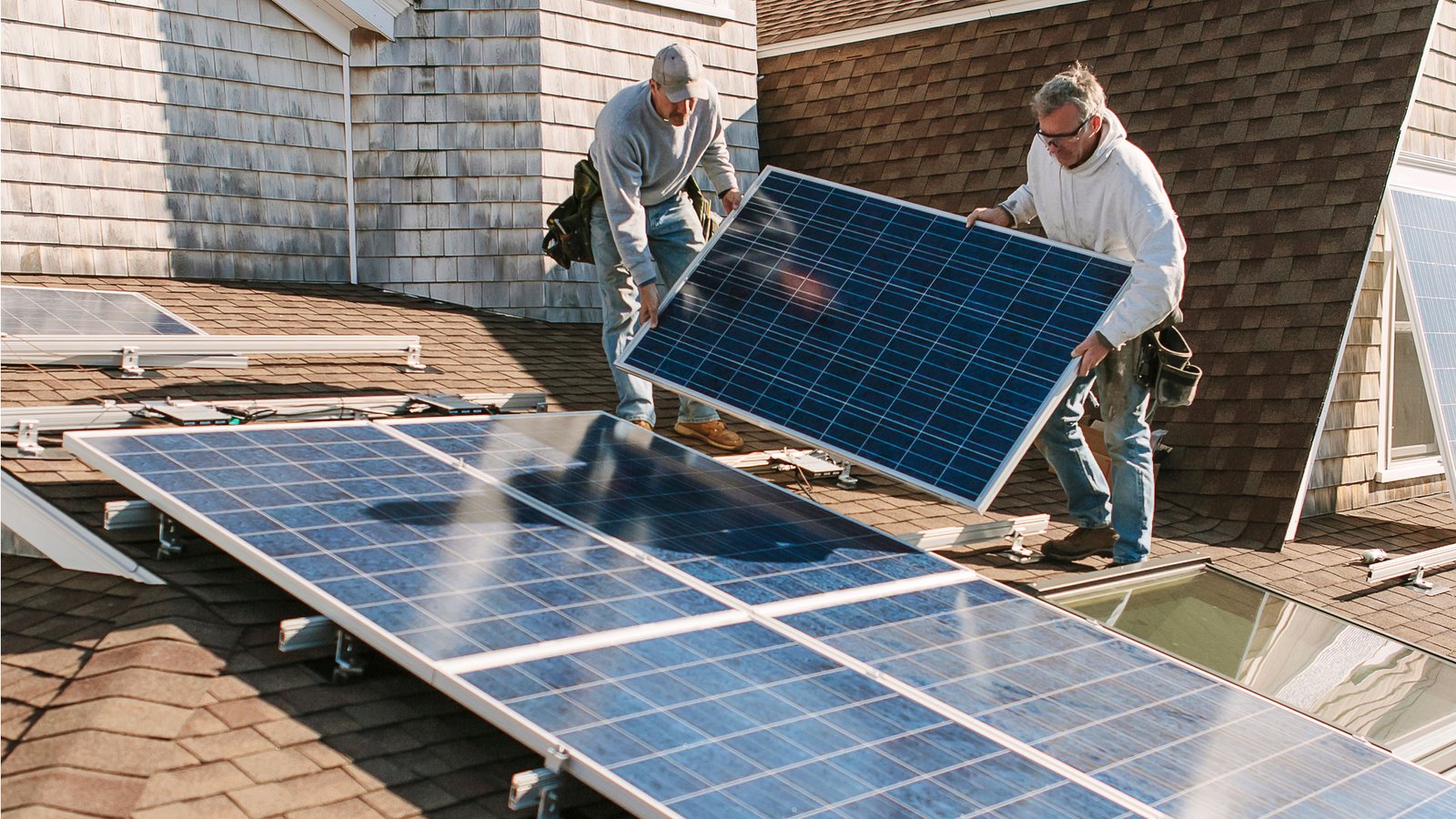

 Solar Panel Products & Articles
Solar Panel Products & Articles Other Products & Services
Other Products & Services



